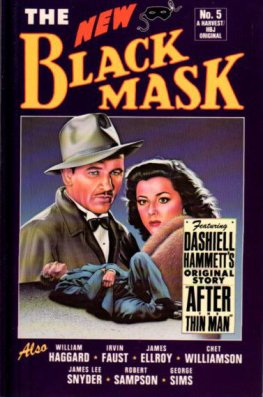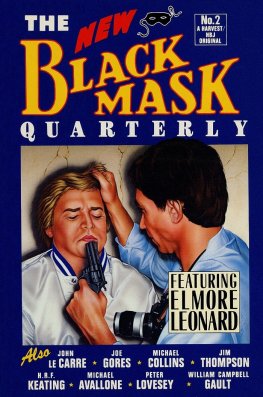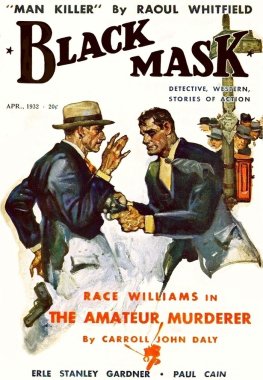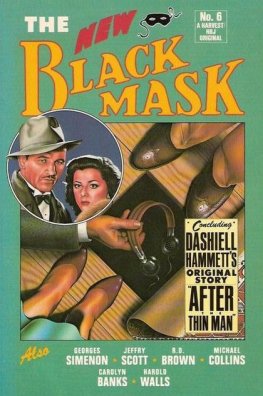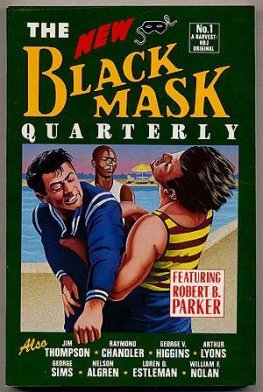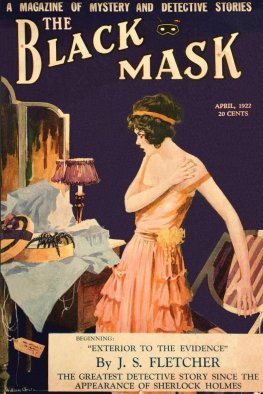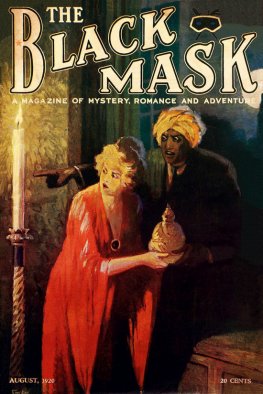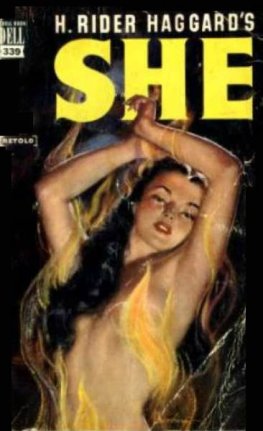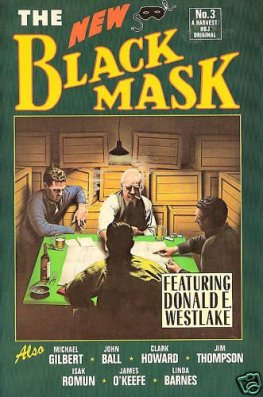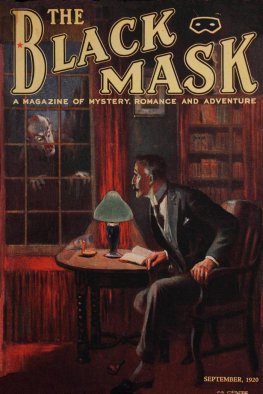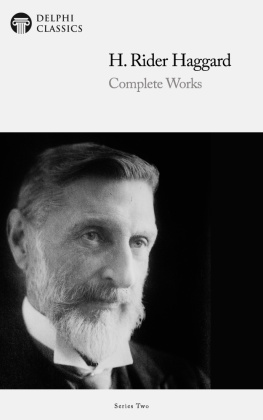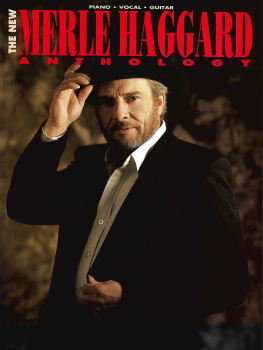William Haggard - The New Black Mask (No 5)
Here you can read online William Haggard - The New Black Mask (No 5) full text of the book (entire story) in english for free. Download pdf and epub, get meaning, cover and reviews about this ebook. year: 1986, publisher: A Harvest/HJB book Harcourt Brace Jovanovich, genre: Detective and thriller. Description of the work, (preface) as well as reviews are available. Best literature library LitArk.com created for fans of good reading and offers a wide selection of genres:
Romance novel
Science fiction
Adventure
Detective
Science
History
Home and family
Prose
Art
Politics
Computer
Non-fiction
Religion
Business
Children
Humor
Choose a favorite category and find really read worthwhile books. Enjoy immersion in the world of imagination, feel the emotions of the characters or learn something new for yourself, make an fascinating discovery.
- Book:The New Black Mask (No 5)
- Author:
- Publisher:A Harvest/HJB book Harcourt Brace Jovanovich
- Genre:
- Year:1986
- ISBN:9780156654845
- Rating:5 / 5
- Favourites:Add to favourites
- Your mark:
- 100
- 1
- 2
- 3
- 4
- 5
The New Black Mask (No 5): summary, description and annotation
We offer to read an annotation, description, summary or preface (depends on what the author of the book "The New Black Mask (No 5)" wrote himself). If you haven't found the necessary information about the book — write in the comments, we will try to find it.
The New Black Mask (No 5) — read online for free the complete book (whole text) full work
Below is the text of the book, divided by pages. System saving the place of the last page read, allows you to conveniently read the book "The New Black Mask (No 5)" online for free, without having to search again every time where you left off. Put a bookmark, and you can go to the page where you finished reading at any time.
Font size:
Interval:
Bookmark:
The New Black Mask ( 5)
William Haggard:
An Interview
William Haggard is Richard Clayton, a former civil servant in India and London. In 1958 he published his first book, Slow Burner, which introduced Col. Charles Russell of the British Security Executive, who has been the centred figure in most of the twenty-eight Haggard thrillers. His novels pack sufficient action to be classified as page turners, but Haggard is primarily interested in character motivation and the use or abuse of responsibility. It has been remarked that his fiction provides a meeting ground for the spy story and the novel of manners an offspring of Geoffrey Household and Jane Austen.
He is not yet as well known in America as in England, but a reviewer in the Chicago Daily News declared that The most intelligent suspense novels in the English language are being written by William Haggard. An evident quality of his work is its conservative stance, which has upset liberal British critics. Nevertheless, Haggard is not primarily a political writer; he is concerned with the redities of power and the professionalism of those who exercise it.
William Haggard is published in England by Hodder & Stoughton and in America by Walker.
New Black Mask interviewed Mr. Clayton in his home on the Essex coast.
NBM: How did you turn thriller writer?
Haggard: I was living in a place called Hartley Whitney, which is the rough equivalent of one of those little suburban New York towns, and I was commuting to London. On the way up I read the papers this was in 1958 and on the way home I read suspense novels. Now this was just before the great flood of them. I couldnt get enough to read. I read people like Geoffrey Household, but I didnt like Ian Fleming at all, and I thought, well possibly theres a market here. Something between the knockabout, common or garden-variety cliff-hanger and the later rather highbrow, intellectual thrillers. So I had a shot at it, and I took it to Innes Rose at the Farquharson literary agency. He told me what seemed wrong. I hadnt constructed it properly. So I took it away. When I took it back to him after making some changes, he said, You know, I can sell this to the first publisher I take it to. And he did. He sold it to Cassell. That was the first book I did, called Slow Burner. That was way back in 1958, and Id got rather hooked on writing thrillers. And I went on writing thrillers.
NBM: Slow Burner was the first novel you ever wrote?
Haggard: Id never written a word before that.
NBM: No literary apprenticeship in school? Writing for the school magazines? That sort of thing?
Haggard: I wrote the house notes for my school, but thats the lot. Id never written anything else. Or ever thought of writing fiction. It must be in the blood, because my mothers name was Haggard. Thats why I took it. As you know, there was a very successful Victorian writer called H. Rider Haggard, but Im not descended from him. My grandfather wrote a lot of pamphlets, so I suppose the itch to write was in the# blood. So there it was. I took this up, and it seemed to go very well. One thing that went very strongly for me was that Id read a lot of American authors.
NBM: Which ones?
Haggard: Ones that youve probably never heard of. People like Joseph Hergesheimer and Willa Cather, twenties and thirties. Now at that time my own contemporaries were swooning over Aldous Huxley or Rosamund Lehmann and that sort of thing. I couldnt stomach it. I had to read some sort of fiction when I was an undergraduate. Undergraduates did have time to read fiction in the twenties. So I read these people. I still have an almost complete collection of Hergesheimer, which I very much treasure. I think hes a much-underestimated novelist. The only other man I know of who shared that opinion is the American critic H. L. Mencken. He thought a lot of him. Well, I share his view. I think he was superb at it.
NBM: Your work is nothing like Hergesheimers. His writing is lush.
Haggard: Very lush. Mines very spare. Ive been told I have difficulty getting it up to sixty or seventy thousand words have to pad it a bit sometimes. My natural length is about fifty thousand words, and of course no publisher wants that.
NBM: Beyond the fact that you enjoyed reading them, why, when you commenced writing, did you settle on the intrigue or espionage novel rather than the murder novel?
Haggard: Two reasons. First, I had a political background in which I was a civil servant. I started life as a civil servant in India. Then in the war I was in the Indian army, and I went to the Staff College; and after I came out of it I went into not the Intelligence Corps but a department which ran the business of operating the Funnies. You know, finding them boots and stopping them sending telegrams to the viceroy. That sort of thing. So I had that background. Also, to a certain extent I enjoyed using the books as vehicles for my own political background. Which indeed I'm afraid they are.
NBM: They certainly are, and some of the English reviewers are really irritated by them.
Haggard: They dont like it a little bit. Theres one of them writes those infuriated reviews in the Glasgow Herald also in the New Statesman, needless to say.
NBM: It seems to me that youre saying something about the decline of English character, about the decline of the English sense of responsibility and duty. I read your works as a lament for the English standards that have vanished since World War II.
Haggard: I agree with that. They are laments. Also I once had to put it this way: I don't think myself that the real enemy is communism. I think its liberal humanism. Thats what we call it. The wet Left. And to my mind its the wet Left thats bringing us down. We may one day indeed even need communism to brace us up again.
NBM: Because they at least have discipline?
Haggard: They at least have discipline and how. I was born in a country vicarage, where its very simple. We werent poor, but we were very far from rich. And that makes you extremely competitive. You can always tell children of the vicarage. People like Virginia Wade. You couldnt get anything more competitive than Virginia Wade. You see, the background was: Look! youre just as good as the boys up at the big house. Just as good. We can give you a good education, and after that youre on your own. We cant leave you any money. Well send you to a good school and university if you can get in which in those days wasnt that difficult and then youre on your own.
I went to Lancing, and then I went to Oxford Christ Church. And then I went into the Indian civil service. And during the war, since I had a reserve commission, I went into the Indian army. I got mixed up in intelligence there. I dont say I was concerned with intelligence gathering at all, evaluating it. I wasnt. But I was certainly very concerned with keeping it on its feet. And preventing it doing anything too outrageous, because intelligence officers are very strange people. I mean they do very unmilitary things. Theyre apt to be extroverts. And then when I came back I went to the home civil service. I then got mixed up in something called Enemy Property, of which I became controller in time. And in 19571 realized that I hadnt got that much more time to do in the Civil Service this was another factor in my turning to writing. I would have an adequate pension, and by that time I had made a little money. But what was I going to do? How was I going to fill the day? So I thought, well, Ill try my hand at writing, and I did. And I stayed with Cassells until they blew up. I was very happy with Cassells. As you know, they were bought by another publisher that didnt do any fiction at all. Then I went to Hodder & Stoughton where Im even more happy. Ive always had very happy relationships with my publishers. Ive always got on with them.
Font size:
Interval:
Bookmark:
Similar books «The New Black Mask (No 5)»
Look at similar books to The New Black Mask (No 5). We have selected literature similar in name and meaning in the hope of providing readers with more options to find new, interesting, not yet read works.
Discussion, reviews of the book The New Black Mask (No 5) and just readers' own opinions. Leave your comments, write what you think about the work, its meaning or the main characters. Specify what exactly you liked and what you didn't like, and why you think so.

